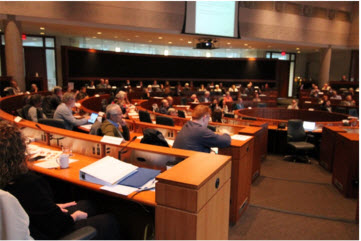There’s a very steep learning curve in a judge’s first year. The BC Provincial Court provides a variety of orientation and training programs to educate and support new judges as they adjust to their new responsibilities. However, the role of a Provincial Court judge in 2023 demands a wide array of skills and knowledge, including not just deciding cases, but courtroom management, mediation, and use of technology, just to name a few.
In this eNews, a judge appointed in the last few years looks back on their first year as a BC Provincial Court judge, remembering some of the highlights and some of the challenges.
What was your first day like?
New judges begin their careers by swearing an oath of office. Although a speech-filled public ceremony is held to welcome a new judge later on, a simple swearing-in ceremony is usually held on a judge’s first day.
Provincial Court Judges' Oath of Office
I ____ do swear that I will truly and faithfully, according to my skill and knowledge, execute the duties, powers and trusts placed in me as a judge of the Provincial Court of British Columbia and that I will be faithful and bear true allegiance to His Majesty King Charles III, his heirs and successors.
Provincial Court Act section 6(4)
My private swearing-in occurred at the end of my first day. That means it came alongside all the stressors associated with the first day of any new job, including navigating new premises, meeting an endless number of people, and learning a different computer system. It was also the first time that I donned my judicial attire, which in and of itself was an experience.

So, by the time the Chief Judge came to escort me to the courtroom where my family and closest friends were waiting to witness my swearing-in, I was feeling pretty overwhelmed. I had nine guests in-person and more watching remotely via Microsoft Teams. After the Chief Judge swore me in, the event was very informal and I was able to exhale. It was a nice opportunity for my family to take in my new surroundings and to meet the Chief Judge. After the ceremony, I enjoyed a lovely dinner with my family and then fell into bed exhausted!
How did you find your first few weeks as a judge?
The Court has designed a comprehensive orientation program for new judges for which I will always be grateful. In addition to administrative-type training, I was able to shadow other judges for approximately three weeks. This was incredibly helpful. I was able to observe the various types of proceedings over which Provincial Court judges preside and to ask questions to better understand the judge’s role and responsibilities.
The experience also introduced me to judges who have since become mentors and friends. I was also assigned an official mentor judge. I checked in with her weekly to review any questions or issues that may have arisen during the week. While we don’t chat weekly anymore, she remains one of my go-to people and I feel very fortunate to have her in my corner.
This orientation period also gave me time to review the online education materials provided by the Court, including statues and caselaw I would be applying in my work. With this preparation, I felt much more comfortable when I began conducting conferences and trials in court.
Did you receive additional education after your first few weeks?

Yes. The formal education for new judges is extensive. In addition to the initial orientation program, new BC Provincial Court judges attend criminal law and family law “boot camps”. These are multi day sessions organized for new appointees and presented by the judges from the Court’s Criminal and Family Law Committees. They address the main substantive and procedural aspects of these areas of law. New judges in our court also attend an intensive, practical two day judgment writing workshop.
To reduce travel costs, these “in house” courses are scheduled in the days before the semi annual education conferences attended by all BC Provincial Court judges. These two and a half day programs are organized by judges from the Court’s Education Committee on legal and social context topics.
Recent appointees to our court also attend two national programs for new judges: the Canadian Association of Provincial Court Judges (CAPCJ) New Judges Education Program, and the National Judicial Institute (NJI) Newly Appointed Provincial and Territorial Judges’ Skills Seminar. These are week-long courses with judges attending from across the country. Both these courses were very well administered and worthwhile. The breadth and quality of the material covered was excellent and I will continue to draw on the lessons I learned there throughout my judicial career. Another benefit of these programs was meeting judges from across the country and hearing their perspectives.
Both the Court’s Criminal Law Boot Camp and the CAPCJ program included training on sexual assault trials.
On top of all that, the Court selects further specific educational opportunities for each judge based on the judge’s background and other individual factors. The goal is to focus on more substantive legal issues to complement other training offered by the Court.
What was your public welcoming ceremony like?
At the public welcoming ceremony, the Chief Judge and Regional Administrative Judge, along with representatives of the federal and provincial Crown, the BC Law Society, Canadian Bar Association, and local bar association all officially welcome the new judge to the Court.
For my ceremony, attendees included family, friends, and new and former colleagues. They packed the courtroom and attended remotely using Microsoft Teams. Most of us don’t have the opportunity to hear ourselves eulogized, so this was a unique experience. In particular, it was a gift to hear how I had positively impacted others, and it felt like an important transition from my former life as a lawyer to my new role as a judge.
Did you find it difficult to adjust to your new role?
For me, the biggest and oddest change was people addressing me as “Judge” or “your honour”, rather than by my first name. Before my appointment, I was usually called by my first name, so the formality took some getting used to.
As the Chief Judge often reminds us, “You are a judge 24/7”, so while I continue to enjoy the same kinds of activities with the same wonderful friends that I did before my appointment, I am aware that as a judge, I am accountable to the public for my actions. Also, while I have always valued privacy, including foregoing social media, I am even more vigilant about keeping a protective bubble around my personal life and those within it.
I’m also still adjusting to the mental demands of being a judge. It requires prolonged periods of intense concentration and focus, followed by the often immediate analysis of large volumes of information. I can almost feel my brain working at full capacity sometimes. The act of making decisions, sometimes dozens of them in a day, that impact peoples’ lives and liberty, is a weighty responsibility. It can be a lot to process at the end of a day or week. It’s rigorous, important work, and I feel privileged to be doing it.

